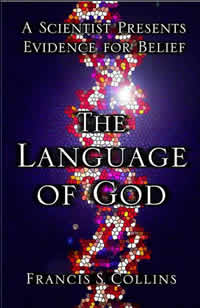Book Notes
 Francis S. Collins, The Language of God; A Scientist Presents Evidence for Belief in God (New York: Free Press, 2006), 295pp.
Francis S. Collins, The Language of God; A Scientist Presents Evidence for Belief in God (New York: Free Press, 2006), 295pp.
On June 26, 2000, Francis Collins stood next to President Bill Clinton in the East Room of the White House, where together they announced to the world that the Human Genome Project had completed a first draft of all 3.1 billion letters of the DNA code. "Today," said Clinton, "we are learning the language in which God created life." As head of the project, Collins managed over 2,000 scientists in 20 genome centers in six countries. Not bad for someone who was born, raised and home-schooled on a dirt farm with no running water or farm machinery.
Collins describes that day in the White House as both a celebration of a stunning scientific achievement and as "an occasion of worship." Written for a non-technical, general readership, this book relates why he strongly believes that robust faith and rigorous science complement each other. In non-polemical language he rejects the beliefs of those who insist that science and faith necessarily conflict, like the atheist Richard Dawkins or young earthers like Henry Morris, or that they should be compartmentalized into what the Harvard biologist Stephen Gould called "non-overlapping magisteria."
In Part One Collins chronicles his journey from agnosticism to atheism to theism, and finally to a specifically Christian faith, a faith provoked by a bedside conversation with a dying woman, then nourished by reading CS Lewis. In another chapter he deals in quick succession with four common objections to faith—Freud, evil done by religion, the problem of suffering, and miracles. Part Two covers the origins of the universe, the beginnings of life on earth, and then in what is in some ways the most interesting chapter of the book, his personal account of the Human Genome Project that culminated with Clinton's announcement. The six chapters of Part Three comprise the bulk of the book. In separate chapters Collins dispatches with atheism and agnosticism (when science trumps faith), creationism (when faith trumps science), and intelligent design (when science needs divine help). He opts for theistic evolution, which he calls "BioLogos," where science and faith complement each other. Throughout the book Collins only tries to make a case for general theism, but in his last chapter he relates how he moved from a general theism to an active commitment to a specifically Christian faith. A final appendix treats a number of bio-ethical challenges like medical genetics and stem cell research.
Collins has written a winsome book for a popular audience that also manages to be very direct in its objections to obscurantist Christian zeal or over-zealous atheistic scientists. I suspect that his book will be more important because of its author, who rightly commands respect, rather than for what he wrote, which treats complex matters at a basic level. Those who are interested in more technical treatments can complement Collins with the works of John Polkinghorne, Kenneth Miller, Ian Barbour, Arthur Peacocke, Michael Ruse, and others.


